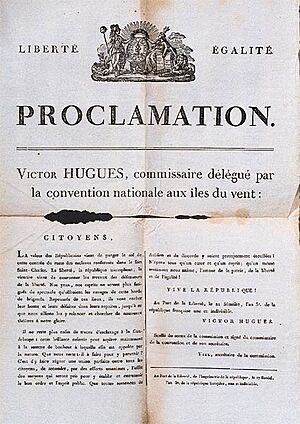Victor Hugues facts for kids
Jean-Baptiste Victor Hugues (born July 20, 1762, in Marseille – died August 12, 1826, in Cayenne) was a French leader and manager of colonies during the French Revolution. He governed Guadeloupe from 1794 to 1798. During his time, he freed the enslaved people on the island, following orders from the French government.
Contents
Early Life and Important Role
Victor Hugues was born into a wealthy family in Marseille. His father, Jean-François Hugues, was a salesman. His mother, Catherine Fodrin, came from a family of silk traders.
In the early 1780s, his family moved to Saint-Domingue (now Haiti) as colonists. However, Victor had to return to France because of the Haitian Revolution. He then became a legal official for a powerful government committee in La Rochelle. He had the support of the local Jacobin Club. Later, he was chosen to be the governor of Guadeloupe. His main job was to make sure slavery ended in all French territories, as ordered in February 1794.
Taking Back Guadeloupe
In April 1794, a British force took control of Guadeloupe. This happened after some plantation owners and French Royalists signed an agreement with the British. They did this because they were against the French Revolution and especially against the end of slavery.
Victor Hugues arrived on the island on May 21, 1794, with about 1,150 soldiers. He immediately announced that slavery was over. This helped him gain the support of enslaved people and free people of color. Within five days, he captured the capital city, Pointe-à-Pitre. By October 6, 1794, Hugues had fully retaken the island. He forced the British general and his troops to surrender.
Even though he ended slavery, Hugues still kept a system of unpaid, required work. He rebuilt the army, bringing in many freed African people. His army grew to about 10,000 men. Soldiers of all backgrounds, both African and European, fought together in the same groups.
Hugues governed Guadeloupe for four years. He removed people who were against the revolution. He also worked to create a new system where the island's farms and plantations could still operate without slavery.
Victor Hugues is also known for allowing privateers to attack ships in the Caribbean Sea. Privateers were private ships allowed by the government to attack enemy ships. This brought a lot of money to Guadeloupe. However, it also caused problems between France and the United States. This conflict is known as the Quasi-War in American history.
Hugues used his army, which included White, mixed-race, and former enslaved soldiers, to spread the revolution to nearby islands. These islands included Dominica, Saint-Martin, Grenada, Saint Vincent, and Saint Lucia. On April 18, 1795, he landed in Saint Lucia with 600 soldiers. They joined local supporters. After some fighting, the British were defeated and left the island on June 19. The French plantation owners who supported the king also fled, and Hugues freed their enslaved people.
Time in Guiana
In 1799, Hugues was sent to French Guiana by the French government. There, he was in charge of making laws about forced labor and later, slavery itself. He continued to be an administrator under the First French Empire. However, he was forced out when British and Portuguese forces captured the colony in 1809.
After returning to France, he was accused of working against his country. He was found not guilty in 1814. He went back to Guiana in 1817, served as governor, and then stayed there as a private citizen.
Cuban writer Alejo Carpentier wrote a famous novel called "El Siglo de las Luces" (Explosion in a Cathedral) in 1962, with Hugues as a main character.
American author James A. Michener also wrote about Hugues's time in Guadeloupe in his historical novel The Caribbean, published in 1989. Michener included facts about Hugues and added him to fictional stories.
See also
 In Spanish: Victor Hughes para niños
In Spanish: Victor Hughes para niños
 | William M. Jackson |
 | Juan E. Gilbert |
 | Neil deGrasse Tyson |


